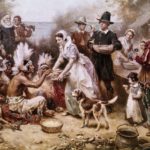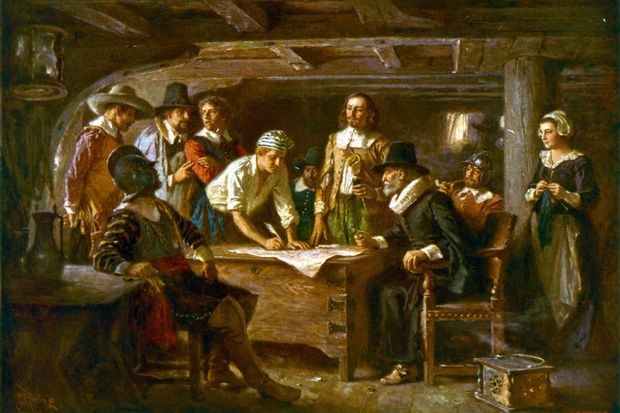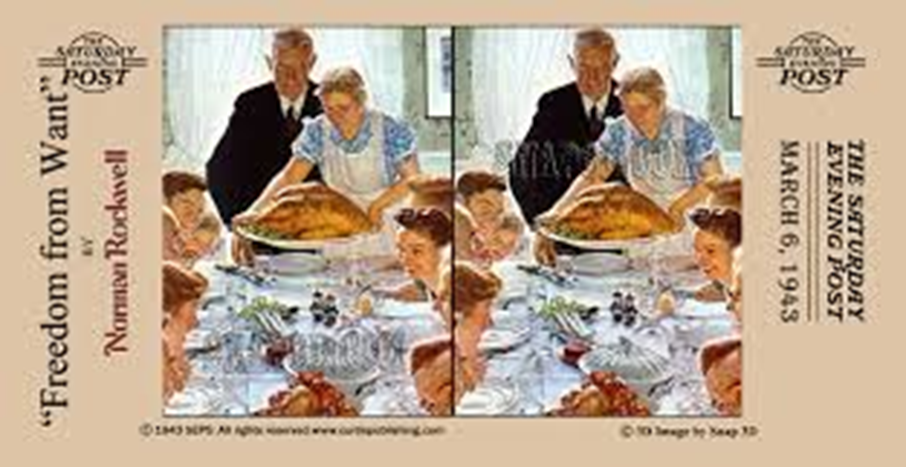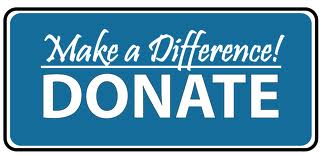We should learn from the hardships and associated lessons-learned by the Pilgrims that provide the foundation of America’s free-market system — so that we don’t repeat their initial missteps. We should recommit ourselves to keeping this land free and prosperous for those who follow us.
Today’s Thanksgiving message completes a quartet of messages. Three weeks ago, the first referred to the Reformation a half century ago, which set the stage for the freedom movement in the Old and New World — as reflected on Geneva’s Reformation Wall that among other historic documents quotes the Mayflower Compact. The second honored our veterans and the third last week reflected on key lessons from the Mayflower Compact signed 400 years earlier on November 11, 1620 — leading to the “First Thanksgiving,” today’s subject.
Due to differences with the Anglican Church of England the Separatists sailed first in 1608 to Holland and then in 1620 to America. With poor navigation, bad weather, rough seas, the renamed “Pilgrims” landed on the shore of what we now know as Plymouth Rock on Cape Cod in Massachusetts, rather than their intended objective in the northern Virginian territory — by some reports at Jamestown near Norfolk and by others at the mouth of the Hudson River now known as Manhattan.
Professor John G. Turner wrote in the November 21, 2020 Wall Street Journal (Page C19) that the Mayflower Compact, drawn up to stave off mutiny among the Pilgrims in 1620, remains a foundational example of democracy. Click here for his full article, “The Mayflower Compact 400 Years Later,” complementing my past three messages and providing the following figure of the signing that cold winter day onboard the Mayflower where the Pilgrims spent their first winter in the New World. Of the 102 Pilgrims that survived the Atlantic crossing, 45 died during that first harsh winter and 41 signed the Mayflower Compact.
The signing of the compact, painted by Jean Leon Gerome Ferris in 1899. Those pictured include John Carver, John Alden, Myles Standish and William Bradford.
Professor Turner mentioned the 1215 Magna Carta that was signed by Great Britain’s King John to avoid civil war, as the foundational step away from the total rule by monarchy and documenting liberties of “free men” and toward recognizing the rights of Anglo-American Jurisprudence.
But I was disappointed that he omitted any reference to the important role of the Reformation, beginning when Martin Luther nailed his 95 Theses to the door of Wittenberg Castle, a century before the Pilgrims crossed the Atlantic. As I wrote in my November 3rd message, the Reformation could trace its heritage to Judeo-Christian origins and led to a profound growth of freedom throughout the Old and New Worlds, as traced in association with Geneva’s Reformation Wall, which among other quotes includes the Mayflower Compact in full.
As I wrote last week, the initially applied conditions of that compact did not serve the original Plymouth colony well. So, the Pilgrim leaders extended them to adopt a system that allowed them, and their successor Americans to this day, to survive and prosper. For this important history, again click here for the diary of William Bradford, a signatory of the Mayflower Compact and five-time governor of the Plymouth Colony.
He records that initially they cleared and worked the land, but they had no great harvest and the spirit of brotherhood withered. Individuals had little incentive to work hard, since were all to share equally in the products of the corporate labor. The lazy did not work — and eventually even the industrious lost interest and worked less.
So, after two years of this failure of socialism/communism, Bradford and the elders of the colony realized that they were on the edge of extinction and they decided to try a radically different approach: They assigned private property rights for divided parcels of land and the right of the individual families to keep the fruits of their own labor. And Plymouth Colony flourished! They satisfied the needs of each family and there was plenty to share with others — so they began to trade according to their individual talents, and the community prospered.
Thus was born American free enterprise, and benefits that far outpaced the attempt to “spread the wealth” and for government to plan and regulate peoples’ lives. Our Pilgrim Fathers tried that utopian fantasy and soon realized its bankruptcy and failure as a way for living together in society. They fostered the innovative idea that when men and women are allowed to follow their own individual and family interests in improving their circumstances, all benefit.
We should bear in mind that important history from our founding when considering the advocacy of today’s so-called “progressives,” who echo the themes of Karl Marx. I much prefer the proven approach of the reformed Pilgrims who abandoned socialism under the Mayflower Compact and adopted the recipe that worked for them and their posterity. It is now called Capitalism, and it has produced the greatest nation on the face of the Eaarth, whatever fault may be found with some of its practitioners. While we can seek to reform those shortcomings, but we should stay the course on the fundamentals.
(To explore the history of socialism that is quite pertinent to politics in America today, I recommend that you consider Bill Federer’s “Socialism: The Real History from Plato to the Present,” published by Amerisearch, Inc. Click here for more information on Bill’s timely interesting book and how to purchase it. Also, check out www.AmericanMinute.com for Bill’s daily messages, that I’d encourage you to consider.)
But whatever their hardships that first year in the New World, note that the Pilgrims’ first Thanksgiving occurred following their first harvest in 1621. In preparing this message, I studied what I could find on the origin of our Thanksgiving tradition — generally attributed to the Pilgrims; but I found little specific direct evidence from the Pilgrims themselves.
Click here and here for two informative and interesting discussions of that first Thanksgiving, which report that only two of those actually present at that first Thanksgiving wrote of the experience. William Bradford, the first Governor, two decades later documented his recollections in “Of Plymouth Plantation.” But most of what historians have learned about the first Thanksgiving apparently comes from a letter written in December 1621 by Edward Winslow, one of the 100 or so people who sailed from England aboard the Mayflower in 1620. Note that the historic event didn’t happen on the fourth Thursday in November, as it does today — and it wasn’t known as Thanksgiving.
With that in mind, I understand the first “Thanksgiving” took place over three days sometime between late September and mid-November in 1621; and it was considered a harvest celebration — though as noted above, the harvest wasn’t all that plentiful. I surmise that the Pilgrims continued their “Old World” tradition of giving thanks for the harvest in each Fall.
About 50 colonists are believed to have attended the 3-day celebration, with feasting, games and military exercises — and included some diplomacy with the Pokanoket Wampanoag, a local Native American society that had begun dealings with the colonists earlier in 1621.
The Plymouth colony attendees included 22 men, four married women (including Edward Winslow’s wife) and more than 25 children and teenagers. Included were the lucky ones who had made it through the rough voyage, followed by a harsh winter during which an epidemic of disease swept through the colony, felling nearly half the original group. They were likely outnumbered more than two-to-one at the event by their Native American counterparts, who earlier in 1621 had introduced them to planting and harvesting corn.
They probably enjoyed a quite different fare than what we’re used to seeing on our Thanksgiving tables today, but it was a feast. They probably had wild turkey, venison (Winslow wrote that the Native Americans killed five deer and presented them to the colonists), and shellfish, which were abundant in the region — as well as fruits and vegetables from the colonists’ gardens (e.g., cabbage, carrot, cucumbers, leeks, lettuce, parsnips, pumpkins) and wild plants that they learned to cook, including artichokes, garlic, cranberries, Concord grapes, walnuts and chestnuts.
I surmise that the Pilgrims continued their “Old World” tradition of giving thanks for the harvest in each Fall — probably earlier in the year than has been our tradition. The Continental Congress called for a day of thanksgiving on December 18, 1777, and President George Washington in 1789 declared the last Thursday of November as a National day of thanksgiving. But it was not an annual holiday until Abraham Lincoln established it in 1863, following the Union’s Gettysburg victory, no doubt intended to help heal the divided nation during the Civil War.
In any case . . . whatever the specifics of that First Thanksgiving during that troubled time, we should remember it when we consider our Thanksgiving this year as we hunker down from COVID-19 fears. In whatever conditions are permitted by the current pandemic, we should remember the birth of free enterprise in the New World of America — and the subsequent founding of our great nation. We need to thank God for these blessings, and commit ourselves to seeing them renewed and preserved.
This is the proper context for viewing the challenges before us — as Ronald Reagan most soberly once warned:
“Freedom is never more than one generation away from extinction. We didn’t pass it to our children in the bloodstream. It must be fought for, protected, and handed on for them to do the same, or one day we will spend our sunset years telling our children and our children’s children what it was once like in the United States where men were free.”
There are obvious implications of the Plymouth colony experience that now cry out for America not to sink into an abyss of socialism.
Beyond these spiritual concerns, there are existential physical threats that “the powers that be” need to address to protect all we hold dear. As we give thanks for all the blessings we have, we should pray that the Sovereign of the Universe meets our future needs. As Benjamin Franklin notably advised during the birth pains of our nation,
“I have lived, Sir, a long time and the longer I live, the more convincing proofs I see of this truth — that God governs in the affairs of men. And if a sparrow cannot fall to the ground without his notice, is it probable that an empire can rise without his aid? We have been assured, Sir, in the sacred writings that ‘except the Lord build they labor in vain that build it.’ I firmly believe this; and I also believe that without his concurring aid we shall succeed in this political building no better than the Builders of Babel.”
Note the date on the below famous Norman Rockwell painting that adorned the Saturday Evening Post — in the midst of World War II when the future was still very uncertain. As the “Greatest Generation” that saved Western Civilization fades from the scene and at least some of us who were the first beneficiaries of their wisdom and courage are in our twilight years, I fear that we have not taught today’s “millennials” these important lessons.
To conclude my quartet of messages, consider Henry Alford’s “Come, Ye Thankful People, Come” first written in 1844, while he was rector of Aston Sandford church in Buckinghamshire, England—and subsequently revised several times. When I was a boy, it was commonly sung in our Thanksgiving celebrations.
COME, YE THANKFUL PEOPLE COME!
Come, ye thankful people, come,
Raise the song of harvest home!
All is safely gathered in,
Ere the winter storms begin;
God, our Maker, doth provide
For our wants to be supplied;
Come to God’s own temple, come;
Raise the song of harvest home!
We ourselves are God’s own field,
Fruit unto his praise to yield;
Wheat and tares together sown
Unto joy or sorrow grown;
First the blade and then the ear,
Then the full corn shall appear;
Grant, O harvest Lord, that we
Wholesome grain and pure may be.
For the Lord our God shall come,
And shall take the harvest home;
From His field shall in that day
All offences purge away,
Giving angels charge at last
In the fire the tares to cast;
But the fruitful ears to store
In the garner evermore.
Then, thou Church triumphant come,
Raise the song of harvest home!
All be safely gathered in,
Free from sorrow, free from sin,
There, forever purified,
In God’s garner to abide;
Come, ten thousand angels, come,
Raise the glorious harvest home!
Bottom Lines.
As we give thanks this Thanksgiving for all we have inherited, pray we can find a way to return to the American dream that has previously stirred so many — and kept us free.
This is a challenge with today’s divided political leadership, but we’ve also been there before — so, we should press ahead, while praying for the future for our nation.
What can you do?
Join us in praying for our nation, and for a rebirth of the freedom sought, achieved and passed to us by those who came before us.
Help us to spread our message to the grass roots and to encourage all “powers that be” to provide for the common defense as they are sworn to do.
Begin by passing this message to your friends and suggest they visit our webpage www.highfrontier.org, for more information. Also, please encourage your sphere of influence to sign up for our weekly e-newsletter.
Encourage them to review our past email messages, posted on www.highfrontier.org, to learn about many details related to the existential man-made and natural EMP threats and how we can protect America against them. I hope you will help us with our urgently needed efforts, which I will be discussing in future messages.
Click here to make a tax deductible gift. If you prefer to mail a check, Please send it High Frontier, 20 F Street 7th Floor, Washington, DC 20001.
E-Mail Message 201124
Please click here to read Past Weekly Updates!
Please help High Frontier continue this important and timely work!
Be sure to follow us on our Social Sites!
If you found this letter via our Social Sites, and you would like to subscribe, please click below!







